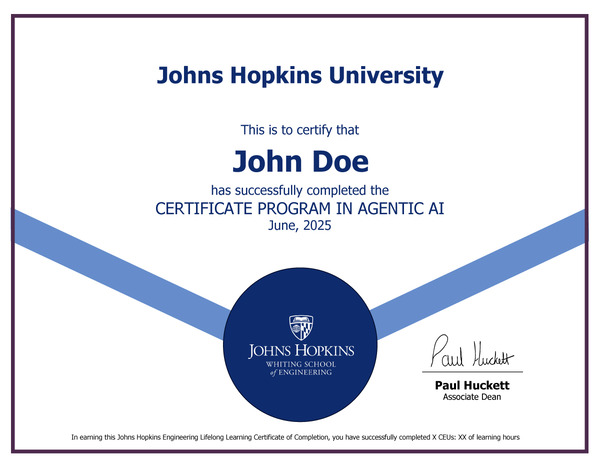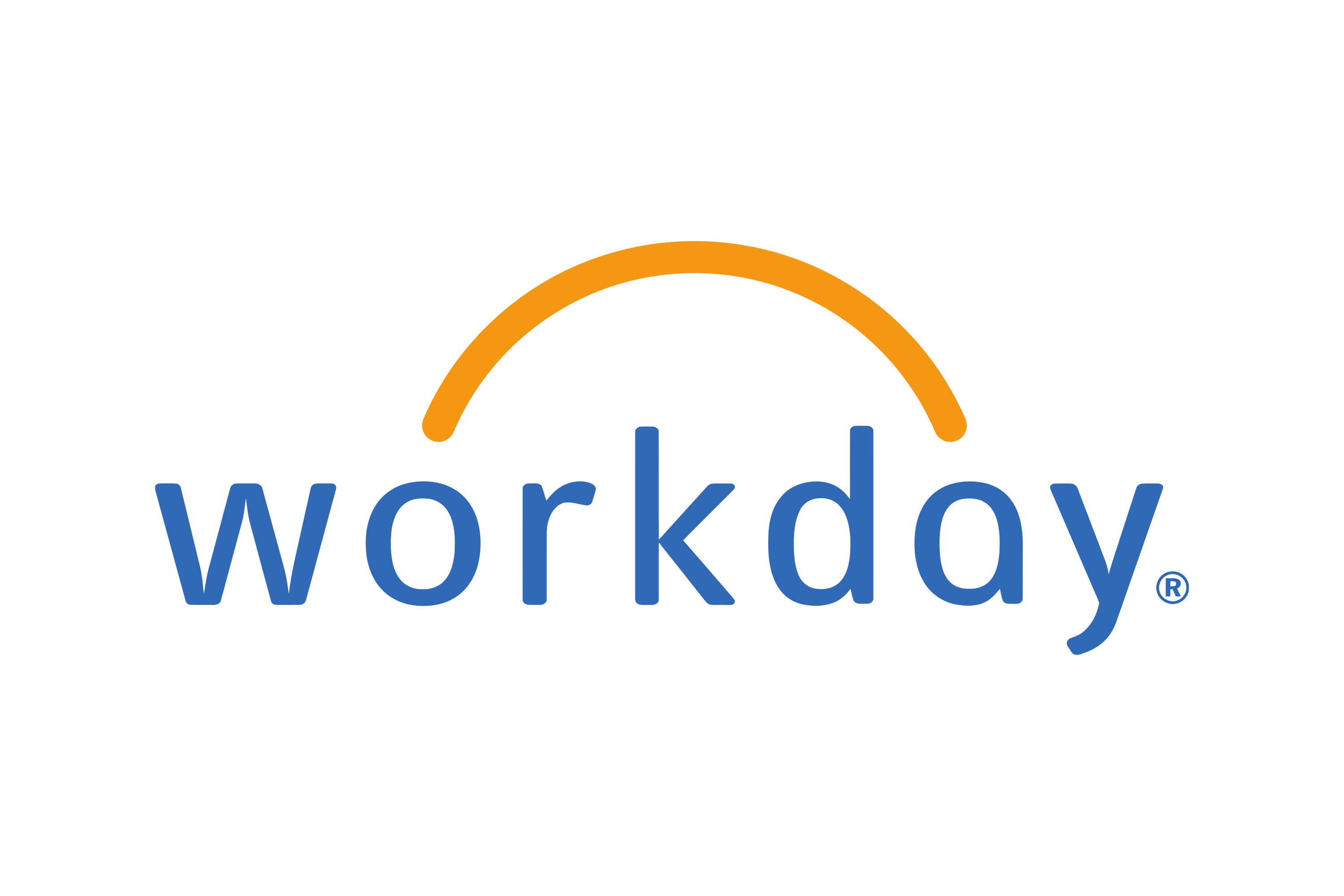Learn more about the course
Get details on syllabus, projects, tools, and more

Certificate Program in Agentic AI
Learn from World-Renowned JHU Faculty
Application closes 22nd Jul 2025

PROGRAM OUTCOMES
Advance your career with Agentic AI skills
Build and evaluate your own intelligent agents with Python
-
Understand and apply frameworks like ReAct and Chain-of-Thought (CoT)
-
Design agents using symbolic, BDI, and LLM architectures for specific tasks
-
Build agents that perceive, reason, plan, act, and learn with Python and AI
-
Evaluate agent behavior in complex multi-agent and human-agent environments
-
Address ethical and safety challenges in AI deployment with responsible AI principles
-
Integrate skills into functional agent-based systems to solve real-world problems
Earn a Certificate of Completion from Johns Hopkins University
KEY PROGRAM HIGHLIGHTS
Why choose the Certificate Program in Agentic AI
-

Learn from a top-ranked university
Learn from expert JHU faculty and industry leaders.
-

Industry-focused curriculum
Gain practical skills in agentic architectures, reasoning models, multi-agent systems, reinforcement learning, and more.
-

Flexible learning format
Learn from a blend of recorded lectures, live mentored sessions, and AI-assisted learning tools.
-

Live masterclass, hands-on projects
Work on real-world, hands-on projects to build practical skills in Agentic AI and stand out to employers.
-

Live mentorship sessions with industry experts
Benefit from professional insights from expert industry practitioners in AI, refine your projects, and set yourself up for success in the field.
-

Dedicated support
Access a dedicated Program Manager and Academic Learning Support, which includes discussion forums and peer groups for a comprehensive learning experience.
Skills you will learn
Agent Architecture and Design
Reinforcement Learning
Human-Agent Collaboration
Python Programming for Agentic AI
LLM Integration & Prompt Engineering
Agentic AI Frameworks
Agent Architecture and Design
Reinforcement Learning
Human-Agent Collaboration
Python Programming for Agentic AI
LLM Integration & Prompt Engineering
Agentic AI Frameworks
view more
- Overview
- Curriculum
- Projects
- Tools
- Certificate
- Faculty
- Mentors
- Fees

This program is ideal for
Professionals looking to advance their careers with Agentic AI skills
-
STEM Professionals
For technical professionals with experience in programming, mathematics, or system design.
-
Data and AI Professionals
Data Scientists, AI Engineers, and ML practitioners looking to develop autonomous agent systems.
-
Technical Managers and Product Managers
For leaders aiming to guide intelligent automation and integrate agent-based AI into business workflows.
-
Aspiring Tech Professionals
Learners without coding backgrounds can start with Python prep modules and advance with structured support.
Program curriculum
The curriculum is designed by the faculty of Johns Hopkins University and leading industry practitioners. It is taught by best-in-class professors and practicing AI Engineers and Data Professionals.
PRE-WORK: PYTHON REFRESHER FOR AGENTIC AI
This module will familiarize learners with all the tools needed for their learning journey and build a solid foundation in Python, object-oriented programming, and essential data science libraries.
MODULE 1: PROMPT ENGINEERING FOUNDATIONS
The outcome of this module is to equip learners with a strong understanding of the fundamentals of Prompt Engineering in the context of Generative AI. Learners will explore how Large Language Models (LLMs) function, uncover the mechanics behind their capabilities, and comprehend how thoughtfully designed prompts can optimize outcomes. The module also introduces the concept of Agentic AI, where autonomous systems make decisions and take actions based on human-like reasoning. By the end of the module, learners will gain practical knowledge of various prompting strategies and understand how to leverage retrieval techniques to enhance AI-generated responses.
WEEK 1: INTRODUCTION TO LARGE LANGUAGE MODELS
This week, learners will be introduced to the foundational concepts of Generative AI and Large Language Models. They will gain an understanding of how LLMs are trained, the architecture that powers them, and the principles that guide their generative behavior. The week will also explore the evolution of prompting methods: Zero-Shot, One-Shot, and Few-Shot, and their role in guiding model outputs. Learners will examine real-world use cases across business functions such as Marketing, Finance, Healthcare, and Productivity, enabling them to recognize the growing influence of Generative AI in industry applications.
WEEK 2: PROMPT ENGINEERING TECHNIQUES
This week, learners will explore advanced Prompt Engineering strategies to enhance the effectiveness of natural language interactions with LLMs. They will delve into Chain-of-Thought Prompting, which improves reasoning by guiding the model through intermediate steps. The week will also introduce the concept of Retrieval-Augmented Generation (RAG), which combines the generative capabilities of LLMs with the precision of external data sources. Learners will gain hands-on experience working with vector databases and understand how integrated retrieval systems improve the contextual accuracy of AI-generated outputs.
MODULE 2: INTRODUCTION TO AGENTIC AI DESIGN
The outcome of this module is to provide learners with a comprehensive understanding of Agentic AI, focusing on its core concepts, distinguishing characteristics, and practical applications. Learners will explore what defines an agent, understand how environment types and agent properties influence behavior, and evaluate the interplay of autonomy, goal complexity, and reasoning in intelligent systems. The module blends conceptual foundations with hands-on experience, enabling learners to critically assess the differences between traditional AI models and agentic systems and design agents for varied real-world scenarios.
WEEK 3: INTRODUCTION TO AGENTIC AI
This week, learners will be introduced to the foundational concepts of Agentic AI, distinguishing it from traditional AI systems. The week focuses on the characteristics that define agentic behavior, including autonomy, perception, and goal-driven actions. Learners will understand the concept of rational agents as models for autonomous decision-making and discover how agentic workflows orchestrate the interaction between perception, reasoning, and action in dynamic environments.
WEEK 4: CORE AGENT CONCEPTS
This week, learners will explore the essential properties of intelligent agents and the types of environments in which they operate. The week introduces the PEAS framework (Performance, Environment, Actuators, Sensors) to define the task environment of an intelligent agent, outlining how it perceives and acts in the world. Learners will compare various types of agents by assessing their levels of autonomy and goal complexity to understand how different configurations impact the behavior of AI agents.
WEEK 5: PLANNING AND REASONING MECHANISMS
This week, learners will gain insights into how agents plan and reason through different paradigms. The week covers classical planning methods as well as reasoning approaches powered by LLMs, including Chain-of-Thought (CoT) and ReAct (Reasoning and Acting). By exploring these mechanisms, learners will learn how agents deconstruct complex tasks and take rational actions to achieve their goals.
WEEK 6: SYMBOLIC AND HYBRID ARCHITECTURES
This week introduces learners to symbolic reasoning frameworks, specifically the Belief-Desire-Intention (BDI) model, and examines how these symbolic structures underpin agent behavior. Learners will also explore Neuro-Symbolic AI (NSAI), where the reasoning power of symbolic models is enhanced through the learning capabilities of neural networks. This hybrid approach enables the design of agents with robust decision-making skills in complex environments.
WEEK 7: LLM-BASED ARCHITECTURES
This week, learners will examine the core modules of LLM-based agents: memory, planning, and action, and understand how they work together to structure intelligent behavior. The concept of scaffolding will be introduced to demonstrate how agents manage workflows, while the use of external tools through action modules will be explored to understand how agents extend their functionality.
WEEK 8: SAMPLE PROJECT 1 - SMART DATA PROCESSING AGENT
This project focuses on developing an intelligent agent to automate the processing of employee-submitted expense bills. The agent will analyze submissions and generate expense claim documents that are fully compliant with established company expense policies. Domain: Productivity and Workflow Automation.
WEEK 9: LEARNING BREAK
MODULE 3: DESIGNING AND BUILDING AGENTIC SYSTEMS
The goal of this module is to equip learners with the skills and knowledge to build intelligent agents that can learn from and adapt to their environments. By exploring foundational and advanced reinforcement learning techniques, multi-agent systems, and embodied AI, learners will gain a comprehensive understanding of how agent behaviors can be optimized through learning and interaction. This module also delves into the integration of LLMs with agentic frameworks and provides opportunities for hands-on implementation through guided case studies and projects.
WEEK 10: REINFORCEMENT LEARNING IN AGENTS
This week focuses on how agents can improve decision-making through reinforcement learning (RL). Learners will explore both foundational RL methods and advanced techniques like Deep RL and Verbal RL. The week emphasizes how learning from rewards enables agents to develop optimal behaviors and adapt to new environments, laying the groundwork for long-term agent adaptability and lifelong learning.
WEEK 11: MULTI-AGENT SYSTEMS (MAS)
This week, learners will explore the dynamics of Multi-Agent Systems (MAS) where multiple intelligent agents interact, coordinate, and communicate. Core concepts like coordination, cooperation, and basic communication protocols will be covered, alongside game theory principles for analyzing strategic interactions. The integration of Large Language Models into MAS architectures will also be explored to show how agents can reason and communicate in more natural and effective ways.
WEEK 12: INTERACTION AND EMBODIMENT
This week introduces learners to Human-Agent Interaction (HAI) and the design of embodied agents that can operate in real-world or simulated physical spaces. Topics include establishing trust, creating common ground for interaction, and the use of virtual environments in training embodied agents. Learners will understand the importance of emotional intelligence, empathy, and contextual awareness in designing agents that support human needs.
WEEK 13: SAMPLE PROJECT 2 - AUTOMATED RESEARCH AGENT
This project involves creating an automated research agent designed to retrieve and synthesize information from multiple data sources, including the internet. The agent will provide comprehensive and iteratively refined answers to user queries, enhancing the depth and accuracy of information retrieval.
MODULE 4: ADVANCED AGENTIC AI FRAMEWORKS
This module focuses on the critical ethical dimensions and advanced technical frameworks of Agentic AI. Learners will investigate challenges related to AI alignment, safety, and responsibility while exploring leading agent development tools and frameworks. The module aims to empower learners to critically evaluate agent behaviors through an ethical lens and implement responsible AI principles in practical applications, culminating in a hands-on project developing an intelligent customer support chatbot.
WEEK 14: ETHICS, SAFETY, ALIGNMENT & RESPONSIBLE AI
This week introduces learners to the AI alignment problem and the key ethical challenges specific to agentic AI systems. Topics include safety concerns, responsibility in autonomous agents, and frameworks for responsible AI governance. Learners will analyze unique risks posed by agentic properties and apply ethical reasoning to assess agent scenarios, ensuring safe and trustworthy AI deployment.
WEEK 15: AGENTIC AI FRAMEWORKS AND TOOLS
This week covers the technical landscape of agentic AI development frameworks. Learners will explore popular tools such as LangChain, AutoGen, and CrewAI for building single-agent Retrieval-Augmented Generation (RAG) systems, as well as multi-agent reinforcement learning frameworks like PettingZoo. The focus will be on selecting appropriate frameworks for different agentic tasks and understanding how to effectively coordinate multi-agent environments.
WEEK 16: SAMPLE PROJECT 3 - CUSTOMER SUPPORT CHATBOT WITH KNOWLEDGE BASE INTEGRATION
This project entails the development of a customer support chatbot engineered to address frequently asked questions (FAQs) concerning a specific product or service. The agent will leverage a predefined knowledge base, employ advanced knowledge retrieval techniques, engage in natural language interactions, and integrate a Large Language Model (LLM) to enhance communication clarity and user experience.
Domain: Customer Support & Automation
Learn in-demand tools and techniques
Build a solid foundation in popular/advanced tools and frameworks top employers seek
-

Python on Google Colab and VSCode
-

Vector Databases
-

RAG (Retrieval Augmented Generation)
-

Agentic AI Frameworks
-

LangChain
-

ControlFlow
-

CrewAI
-

LangGraph
-

DSPy
-

AutoGen
Earn a certificate of completion from Johns Hopkins University
-

National Recognition
#6 National University by U.S. News & World Report
-

Global Standing
#13 Best Global University by U.S. News & World Report

* Image for illustration only. Certificate subject to change.
Meet your faculty
Learn from world-renowned faculty with domain expertise
Interact with our industry mentors
Interact with dedicated mentors who are current practitioners and experts in Agentic AI
Program fee
The course fee is 3,000 USD
Invest in your career
-

Learn Agentic AI design and deployment
-

Build job-ready skills in agent-based AI
-

Create an industry-ready portfolio of work
-

Earn a certificate of completion from Johns Hopkins University and stand out to employers
Application process
Our admissions close once the required number of participants enroll for the upcoming batch. Apply early to secure your spot.
-

1. Fill application form
Apply by filling out a simple online application form.
-

2. Review process
A panel from Great Learning will review your application to determine your fit for the program.
-

3. Join program
After a final review, you will receive an offer for a seat in the upcoming cohort of the program.
Batch start date
-
Online · To be announced
Admissions Open
Delivered in Collaboration with:
Johns Hopkins University is collaborating with online education provider Great Learning to offer the Certificate Program in Agentic AI. Great Learning is a professional learning company with a global footprint in 170+ countries. Its mission is to make professionals around the globe proficient and future-ready. This program leverages JHU's leadership in innovation, science, engineering, and technical disciplines developed over years of research, teaching, and practice. Great Learning manages the enrollments and provides industry experts, student counselors, course support and guidance to ensure students get hands-on training and live personalized mentorship on the application of concepts taught by the JHU faculty.



 Speak with our expert
Speak with our expert











.png)

















